
Self-Reliance 365 is where people come to relearn the heritage life skills of our forefathers - and the best practical ways on Earth to produce your own healthy food, clean water, resilient energy, mortgage-free shelter, and more. All in abundance.
The "End of the World"-Scenario So Many Are "Prepping" For, Me Included, is What Folks 150 Years Ago Called "Daily Life":
...no electrical power, no refrigerators, no tap water, no Internet, no computers, no hyperactive law enforcement, and no supermarkets loaded with food.
They got things done or else we wouldn't be here!

Let's Put "Prepping" and Self-Reliance Into Perspective. Take a Look At This Chart:
| Daily Life for Most of Human History (60,000+ years) |
Modern Life As We Know It | Daily Life After Disaster Strikes | |
|---|---|---|---|
Electricity |
|||
Running Tap Water |
|||
Supermarkets Full of Food |
|||
Freeze Dried Food and other "Survival" Food |
|||
Automated Heating / AC |
|||
Hyperactive Law Enforcement |
|||
Credit- & Debit Cards |
|||
Garbage Collection & Flush Toilets |
|||
Internet / Computers / TV |
What We Can Learn From Our Ancestors
From: Dan West, Co-Founder and CEO, Walden Labs
In this letter, you'll learn about the wisdom that helped our ancestors survive famines, wars, economic crises, diseases, droughts, and anything else life threw at them... a secret that will help you do the same for your loved ones even if modern civilization crumbles into the ground.
I'm also going to share with you three old lessons that will ensure your children will be well fed through good times and bad. In fact, these three old teachings will improve your life immediately once you hear them.
I think we can learn a lot from our forefathers, not just about surviving to live another day but also about thriving and finding meaning in this day and age, put simply I think our ancestors can show us how to live a better life.
But first let's focus on the survival part. The truth is, there are only six basic ways in which people die. It doesn't matter if we're talking about 8th century Europe or 21th century America, these six threats have always existed and always will:
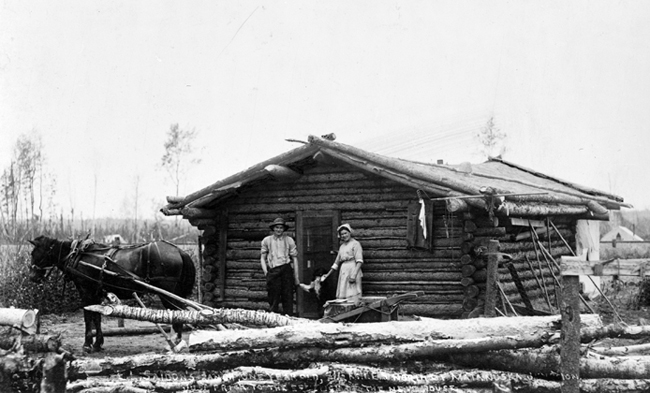
Alaska Homesteaders and their Log Cabin, c. 1900-1930. Photo LC-DIG-ppmsc-02272, Carpenter Coll. Library of Congress Prints & Photographs Div. (cropped)
The Six Timeless Threats To Your Life And Happiness
And The Survival "Rule of 3's"

Being too hot
You can survive for 3 Hours without shelter in a harsh and hot environment (like a desert under the blazing sun). Hyperthermia (heat stroke) kills thousands every year around the world.

Being too cold
Same goes here. Cold temperature will kill you if you’re exposed too long. Hypothermia kills at least 1,500 people in the US every year according to an article in The New England Journal of Medicine.

Thirst
Up to 60% of our bodies are water. The “survival rule of 3’s” says you can survive for 3 Days without water (if sheltered from a harsh environment)

Hunger
You can survive for 3 Weeks without food (if you have water and shelter)

Illness
There are countless of diseases that can kill you, ranging from the flu and smallpox (thankfully eradicated) to cancer or drinking foul water

Injury
People die every year from falling down the stairs, car crashes, being shot and stabbed, getting attacked by bears, food poisoning, and so on.
The Three Essential Services You Need To Survive
Without These You Will Never Thrive
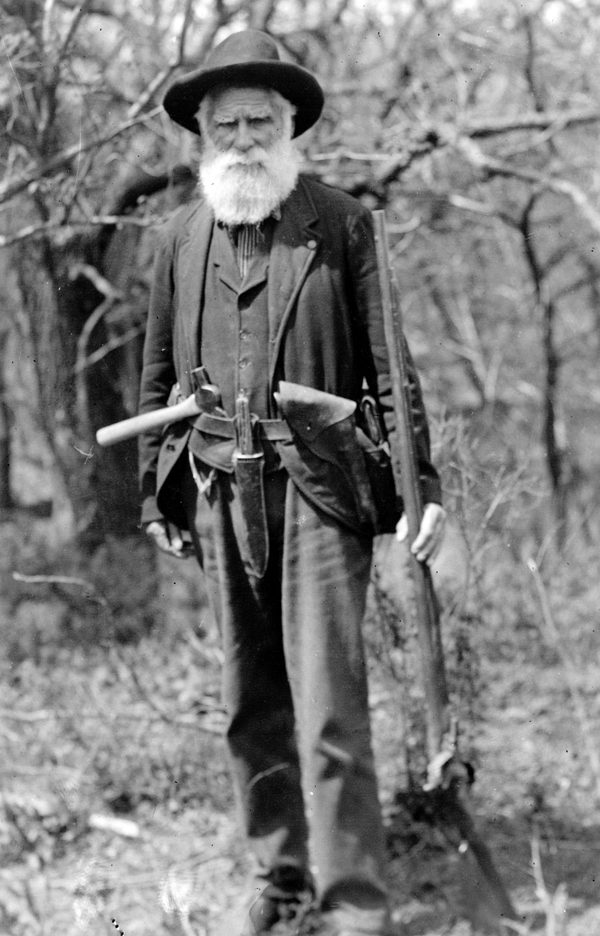
Daniel Freeman (1826-1908), an American physician, Civil War veteran, and the first homesteader to file a claim under the Homestead Act of 1862. Settled in Beatrice, Nebraska. 1863.
Our ancestors were very familiar with these six ways to die. But if you're reading this then you're living proof that your direct ancestors were pretty good at surviving - at least long enough to pass their genes on.
Now, throughout the ages there have been, and still are, three sets of essential services which has protected man from dying. When these essential services are met it will allow you to not only survive, but also give you a solid foundation to thrive.
Henry David Thoreau called these "The necessaries of life", and wrote in Walden that "not till we have secured these are we prepared to entertain the true problems of life with freedom and a prospect of success."
Our ancestors knew this, and from the day they were born their primary education was all about how to secure these necessaries of life, while spending as little time and energy as possible, so that they then could continue in their pursuit of happiness.
Let's be honest, life is not about just surviving. Life starts when you no longer have to worry about where to get your next meal or how to pay the next rent or where to get your next paycheck.
Self-reliance is simply about the life skills that allow you to provide for these three essential services yourself, as much as possible, without being dependent on someone else. It's nothing more or less.
The same goes for "prepping". It's simply about preparing for disruptions to these three necessities of life.
The three essential services are:

1. Shelter
Shelter protects you from getting too hot or too cold. Shelter refers not just to your home and clothes, but also to essential things like power, cooling, heating and so on that makes your home habitable year round. Not all homes have these services, and not all climates require them.

2. Supply of Food and Water
A reliable and regular supply of food and water is a true necessity of life. These essential supplies are provided in very different ways in different parts of the world. In the developed world you likely get your food from a supermarket and your water from a tap; both relatively new inventions, and far from resilient.

3. Safety
Protection from illness is today provided by health care, hospitals, sanitation infrastructure such as flush toilets. Protection from injury is provided by police, security services and the military. In theory anyway. Before modern times, people and communities took responsibility for their own personal protection.
Why Our "Modern" Way of Life Is a Disaster Waiting To Happen
For hundreds of generations our ancestors survived and thrived in balance with nature without electricity, without supermarkets, without running water, without the biggest military spending in the world.
They lived a hard life, but often also a happy and fulfilling life. They did not know the stress that we know today when we bustle about at a meaningless work, away from our family, for most of our productive lives. In many ways their lives were harder than ours, but they also had less worries, more freedom and more time for their loved ones.
Their simpler, more resilient (and some would say more meaningful) way of live was possible because they knew the skills of self-reliance. Skills that were passed down from generation to generation; from father to son and mother to daughter. Heritage life skills.
But these skills are no longer being passed down, they've been largely forgotten by 99.99% of families (in the developed world anyway). Instead we rely on centralized and fragile infrastructure and politicians to do things for us.
Of course I'm not saying we all should go back to living in caves and abandon electricity, tap water and all other modern comforts. I love my dishwasher.
I'm not saying either that we haven't learned anything useful in the past 100 years. Humanity has made great progress developing and putting to use concepts such as permaculture, whole systems design, holistic thinking, and so on. We've also invented brilliant technology such as the internet, computers, solar panels and more that, if put to good use, can help you become a freer human being.
What I am saying is this: It might not be the best idea to be dependent on the status quo and bet ones life, liberty and pursuit of happiness on these modernities. If history shows us anything, and you'll get examples of this in the three important lessons below, it's that taking things for granted is a certain recipe for failure and misery.
Global resilience expert Vinay Gupta, who categorized the six ways to die and three essential services above, has given this topic a great deal of thought. He notes:
In the developing world, the six risks [of death] are increased by a combination of poor physical infrastructure, poverty, and in some areas social instability.
In most crises in the developed world the short term pressures on infrastructure systems do not threaten lives. However, in more severe times of crisis, or in developing world disasters, infrastructure failures can be even more dangerous than the original disaster. Water and sanitation issues are particularly problematic.Vinay Gupta Global Resilience Expert
We've made ourselves dependent on fragile infrastructure outside of our control. So much that we'll only last days without it.
A prominent think tank in the UK, Chatham House, tried to answer the question of how long the world will continue to work if a disaster (big pandemic, war, financial crisis, etc.) shuts down global transportation. Their answer: A week.
It will only take a week (at most) before:
- You won’t be able to buy food at the supermarket.
- You can’t find a gas station with any fuel left.
- The government assumes emergency powers to ration what’s left.
Our dependence is this bad, and at the same time we've forgotten the wisdom and skills that helped our ancestors get through depressions, disasters, famines, wars, droughts, and other hard times by their own accord.
But it's not too late to regain this knowledge and relearn these skills, and pass them on to a next generation. You might need it sooner than you think, be it because you lose your job or all hell breaks loose.
It all starts with this letter, and the three old lessons you'll learn below that will ensure you and your family will be well fed through good times and bad.

Lesson No. 1: |
"Those who cannot remember the past are condemned to repeat it."
Call me old fashioned; I don't care...but I completely believe in what our ancestors stood for.
They all had a part in turning Western civilization and America into the most powerful civilization in the history of mankind.
Many died and suffered before a creative mind found an ingenious solution to - maybe - a century old problem. Believe it or not, our ancestors skills and deeds are all covered in blood. This is why these must be fought for, protected, and handed on for them to do the same for our children or our children's children.
But now, my friends, we are sitting on the edge of oblivion.
Our fathers and our grandfathers were probably the last generation to practice basic things like building a root cellar or making pemmican, the last self-reliant generation. Our ancestors laid the bricks and built the world's strongest foundation...that we are about to irreversibly forget!
And we're going to pay the ultimate price for this. Because if you have a big, strong house with a weak foundation, it doesn't matter if it looks nice on the outside-the next flood will sweep it away! And that is exactly what will happen to most Americans and Europeans in the coming crisis!
Here we are, human beings in the 21st century, several lifetimes and a world away from our grandparents and their ways. Have we become better at living? I think not. I watch as we become ever more expectant that the world owes us a living. Consumerism has reached epic proportions; people feel aggrieved if they don't own the latest gadget.
The truth is we have never been more disconnected from life, from the world, from the soil, from the trees, and from our own souls.
The wealthiest nation in the world is feeding its citizens an unhealthy diet—and growing most of this food using unsustainable methods.
We have a population threatened by a crisis of diet-related chronic illness; millions of acres of damaged farmland; chemical runoff spilling into our waterways.
Over-reliance on the herbicide glyphosate (marketed by Monsanto Co. as Roundup) has spawned a burgeoning population of Roundup-resistant "superweeds" that has become a scourge for farmers in many areas of the U.S., especially the South and Midwest.
We no longer know how to live without refrigerators, without cars, or without supermarkets.
What will you do tomorrow if you simply are unable to buy things?
I sometimes even think we're kidding ourselves with our Bug Out Bags and with our three-day food rations.
Wouldn't we be better off looking at what the pioneers took with them when they traveled from Independence, Missouri all the way to Oregon City?
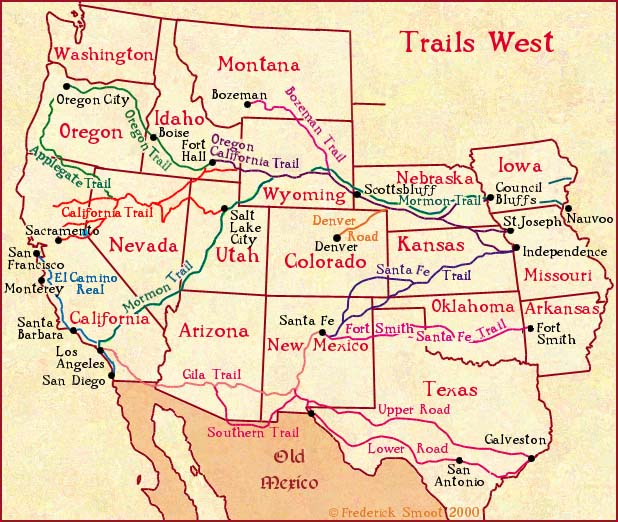
Westward ways across the United States
That was a four- to six-month journey. If your life depended on this, what Bug Out Bag would you take with you? I know I would stick with whatever the pioneer had with him. He had to travel weeks on end without much help while taking cover from some native tribes at the same time. And this is just a small, tiny example!
Guys, I don't want to see our forefathers' knowledge disappear into the darkness of time...and if you care for your family, and what America stands for...then neither should you!
Whatever you do, don't forget lesson number two:
Lesson No. 2: |
Don't Take Anything for Granted!
I grew up without missing a thing. But my great-great grandfather wasn't so lucky. In 1867, when he was only 7 years old, he survived one of the most horrific famines Europe has seen, affecting northern Sweden and Finland. Spring was extremely cold and summer never came.
In the October 17, 1867 issue of London-newspaper The Times one could read about this "one place in Europe where, instead of summer sunshine and bountiful fields, instead of "the joy of harvest" the cry of children for bread, and the moans of men and women dying for want of it."
This was a place where "bread is not to be had for money, and people are living on roots and the bark of trees." Many families survived only because of the lichens they foraged in the forest and the nutritionally deficient bread they baked from fir bark ground into flour.
What you are about to hear is a real recollection that was written in a personal wall almanack during the crisis by Zakarias Wallmark:
May 22: At 11.30am it was 1 degree Celcius with the wind coming in from the northeast. The bushes are still standing straight as an arrow in the swamp and the snow depth is 1 1/2 cubit (old unit of measurement, where 1 cubit is the length from your elbow to the tip of your middle finger).
May 25: Cold wind and no thaw, still full snow cover, depth 1 1/4 cubit. On May 24 we went over the ice and no reed had thawed loose.
June 1: Went across the ice with the sled.
June 17: The swamp was free from ice and in the evening a strong storm came with lots of rain.
June 19: Released the cows. Snow in the forest, no leaves on the trees, no blueberry leaves, no grass in sight.Zakarias Wallmark
Another even grimmer personal recollection comes from homesteader Erik Gideonsson:
The winter of 1867 is the worst year in living memory in Vilhelmina parish.
I was only 9 years old. We lived in Sjöland, an isolated place in the woods far from the nearest village.
It was a terribly cold and difficult winter. Lots of snow and almost impossible to catch a game bird.
Eventually, a terrible last resort was to slaughter our only cow. But the meat ran out, and spring was nowhere to be seen.
Then we took the hair off the cowhide, and cut the skin into small pieces and fried and ate them.
That did us good. But in early spring we were entirely out of food. Now all we had was a pair of old leather boots. But they were tarred so we couldn't fry them like we did with the cowhide.
Then we put the boots in water and boiled out most of the tar, and so we ate them. But we could not get rid of all the tarflavour. I still remember the burn in my throat after we had eaten the boots.
Now everything edible was gone. We were so emaciated that we could not walk. We lay in the beds along the walls. One day I remember that my dad shaved and said that, now we need to prepare to die. Strangely enough, we felt no hunger.Erik Gideonsson
Luckily for Erik his family survived, and he lived to tell the tale, thanks to an uncle who brought them a couple of reindeer steaks in the very last minute. In fact, here he is many decades later in the summer of 1937:
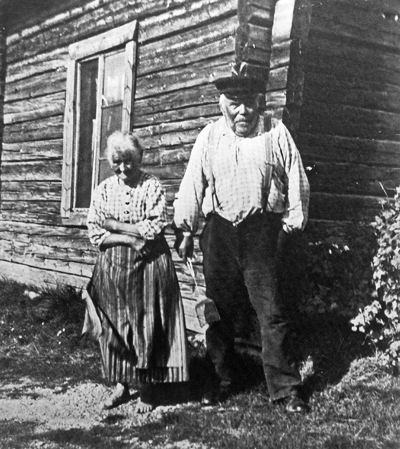
Erik Gideonsson with his wife Stina Lisa, both survivors of the famine, outside of their cabin many decades later.
But many others were not as lucky. Entire families starved to death.
Things were so bad in 1867 that the folks in the Burträsk area couldn't plant the first crops until midsummer, towards the end of June, and conditions were similar in the rest of northern Sweden.
From the villages reports started coming in of suffering and starvation. The barns and larders were empty and prices of the little food that was left spiked - a barrel of rye ended up costing 50 crowns, which was the equivalent of a month's salary for a factory worker. "There is dire shortage of fodder and sheep and goats are dying everywhere." as Anders Olof Myrholm wrote in his journal.
The long winter made it impossible to get started with farming, but it also made it impossible for ships to reach the northern shores with emergency aid. The ships at that time were not powerful enough to breach even lighter ice.
The starving families were on their own.
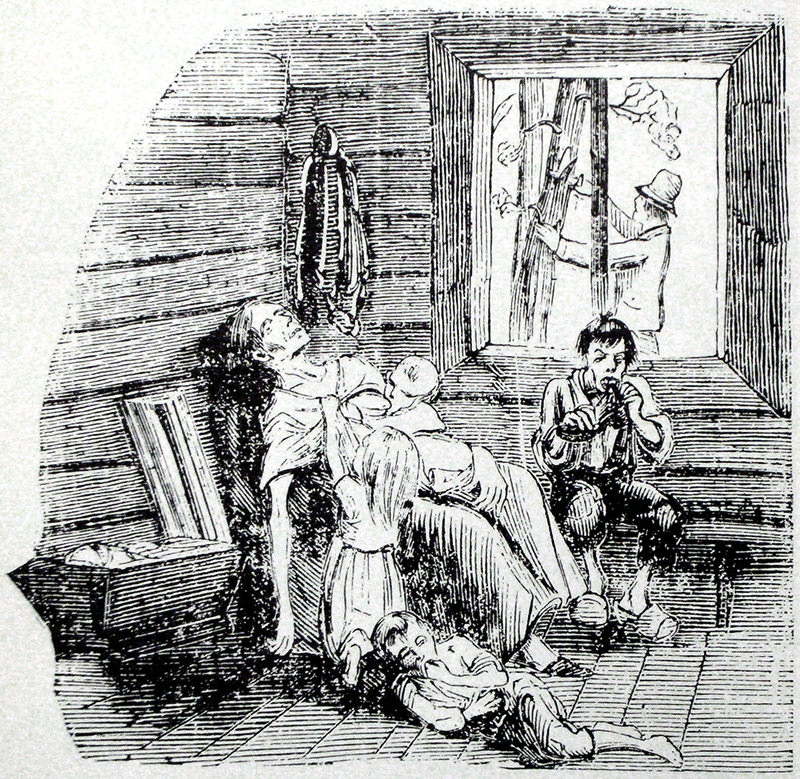
Illustration of the starvation from a newspaper in 1867. A mother is dying, the son is eating a leather boot and the father is carving bark from a tree outside to make bark flour for baking.
But it got even worse. The already severe famine went from deadly to very deadly when it became clear that summer not only came late but also ended prematurely.
To Avaträsk, Lapland, the first frost came on July 18 - death as a white shroud over grain and potato fields. This first frost, grimly referred to as the "night of slit throats", reached my own birthplace a bright, early morning on September 3.
Panic spread among the farmers and in their panic they started to harvest grain that was still green and unripe. The night on September 24 frost killed all vegetation. In minus seven degrees Celcius.
No hope of summer or faith could help them now. The disaster, crop failure, could not be stopped. And it concerned everyone.
On top of this horrifying year the following year, 1868, was not much better. It was drier and resulted in drought and crop failure yet again. People starved, and animals too. Because of malnutrition and disease caused by this famine, death was a familiar part of many families.
People sought out new beginnings within the Nordic countries, but many families also chose to emigrate to North America, "the promised land" during these years. One of them was Erik Grundström, brother of my own great-great-grandfather, who was 5 years old when the famine struck. He emigrated and after a long life died in 1927 in Aitkin, Minnesota, leaving a wife and nine American children behind.
What's tragic about this crisis, the worst famine Europe has seen in centuries, is that while families starved in northern Sweden in 1867, that same year was also a record in swedish exports of grain. The large farms in the southern parts of the country shipped their grain, not to starving families in the north, but to England!
And in this we come back to lesson #1: Don't take anything for granted, including that someone will come to the rescue when things go bad. History has shown that in a crisis, it is everyone for himself!
Please allow me to take a wild guess without getting mad at me... you're probably sitting in front of your computer right now with few major worries, with a half-full fridge, maybe a decent job, and at least a small backyard that you can hold on to...and that's good!
But make no mistake taking this for granted!
History has shown us many times that it can all fly away in a split of a second.
The biggest misstep that you can take now is to think that this can never happen in America or to you!
All that our ancestors who formed America lived through would be in vain without lesson number 3:
Lesson No. 3: |
"It's always up to you."
I believe in God, the Tao, Allah, Brahman, universal intelligence, or whatever you want to call it. I also believe in the power of free will! I believe that you are the only one in charge of your destiny and that you are constantly making decisions that shape the rest of your life.
It's true that we all had different starts, depending on our families and upbringing, but most of us here in the West had at least decent beginnings. We had water and food, we could go shopping from time to time, and we had a decent medical system compared with other parts of the world.
We should be more thankful for that! And we should ensure that we have something put aside for darker times. If anything goes wrong with your country don't blame the government or the president. They don't truly care about you or your family. We are the only one to blame!
I don't know if you've noticed, but nothing just falls from the sky. GOD HELPS YOU, but He does not lay it on your table. You have to work hard and do things yourself! As long as you are aware of this, your destiny rests solely on you and your willpower. You can truly change things! And you can do a lot more than you think you can!
With this idea in mind a few years ago, I wanted to do something that hasn't been done before! Something that not only would help me survive a crisis without investing a fortune in stockpiles, but something that I could do around my house on a daily basis using only methods that were tested and proven by our self-reliant forefathers for centuries.
I wanted to unearth and learn the forgotten ways of our greatgrandparents!
When I was a child, I spent a lot of time with my grandparents, but when I got older there were months when we didn't meet-not because we couldn't stand each other but because I was always too busy working...a lame excuse and a thing that I deeply regret today.
My grandfather passed on many years ago and with him a magnificent amount of survival knowledge. He had been a lumberjack his whole life and spent years sleeping out in the wilderness. I don't know if you're in a similar situation, but think about your grandfather and how many things he did or knew...things that will vanish forever into the dark abyss of ignorance.
I could not learn from my grandfather or grandmother, so I had to turn to other tomes of knowledge, old books and first hand testimonies, to find out how past generations secured shelter, food, water, and safety, and to learn the little secrets that helped them survive in spite of almost everyone else dying.
And because I deeply believed that I was the only one who could change something, my goal for the last couple of years changed from not just "learning" but "saving" our forefathers' ways, so that their knowledge can once again live on in man.
This is one of the most important things that I've done in my life. I'm proud of it, but it took me many difficult years to get here!
First, there is no person that knows all our forefathers' forgotten life skills. Let's just say that there are still a handful of people that still practice a lost skill transmitted from generation to generation even today...but not all the skills of course. I had to get in touch with a lot of different people.
Second, where do you find these people? They are no mainstream survival experts who knows all of these skills; they don't have a website or a TV show. Some of them even live in remote areas without Internet or TV cable, earning a living like the pioneers did!
Third, I wanted to do something unprecedented. You know, articles like "11 Skills Your Great-Grandparents Had That You Don't", and they start listing the skills: hunting, fishing, foraging, butchering, and so on.
Pffff...this kind of information will never help anyone. I needed something solid, exact, and to the point! Not just skills! I wanted to know things that they actually built, ate, and stored and EXACTLY how they did it.
And fourth, I'm not sitting on a gold mine! As much as I enjoyed traveling and learning these skills, I still needed to go to work.
But what I didn't realize when I started my quest is that you can't save these skills only by writing them down. If all these books and writings will be forgotten in a dusty drawer right next to my bed, it won't help anyone.
This knowledge will die together with me, and all my efforts to save our forefathers' ways would have been in vain.
This is because all my life I blindly believed in lesson 3...that "it is always up to me."
But I was wrong! In this case, it's only halfway there!
It's ALSO up to you!
Today is your chance to be part of saving our ancestors' lost ways.
I just hope that there are more people like you and me who deeply believe that the best way to survive the next major crisis is to look back at how people did things 150 years ago.
I wanted to make this information available to every family out there without having to spend years of their lives or thousands of dollars learning by trial and error.
So I came up with this idea to edit all my manuscripts and to turn all this vanishing knowledge into one of the greatest online resources of this century:
Self-Reliance 365
Saving Our Forefathers' Heritage Life Skills
The first step to safeguarding your life and future does not cost you a cent, and it’s this: You need to accept that you are not crazy just because you see the serious consequences from being too dependent on highly fragile infrastructure and a tiny political and financial elite.
If nearly every objective fundamental suggests that the current way of life can not last, maybe it’s time to change how we do things.
How exactly?
By learning from the way of our forefathers. They were producers, not just consumers.
We are vulnerable because of our dependence as consumers. So the way to reverse that, to be resilient and independent, is to become a producer just like your forefathers.
This strategy is nothing new. It's as old as Nature itself. Humans have been self-reliant producers for hundreds of thousands of years, providing their own food, water, energy, shelter, security, etc.
And the good news is: today it’s easier than ever to become a producer, relearn the lost skills of self-reliance and adopt the way of our ancestors. This is what Self-Reliance 365 is all about.
Even on the brink of a complete reset in the financial system and our way of life...
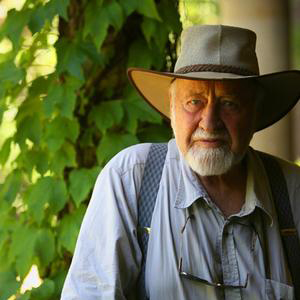
We know how to solve every food, clean energy, and sensible shelter problem in every climate; we have already invented and tested every necessary technique and technical device, and have access to all the biological material that we could ever use.
The tragic reality is that very few sustainable systems are designed or applied by those who hold power, and the reason for this is obvious and simple: to let people arrange their own food, energy, and shelter is to lose economic and political control over them.
Bill Mollison Co-originator of the permaculture concent and founder of Permaculture Institute Tasmania
Self-Reliance 365 Is Not About Learning, It’s About Doing
What is needed to rebuild the self-reliant families and communities of old? Simple and direct knowledge on how people can live a better life, if times get tough or even if they don't.
Many of us today, including myself, don’t have any parents or grandparents that could pass on this knowledge for self-reliance. My grandparents died before I was mature enough to realize the immense value of their wisdom, and my parents never inherited those life skills in the first place because with all their modern comforts and a government taking care of them they did not see any value in the old way of life.
I had to learn it all on my own, through books, mentors, and costly trial and error. But you don’t have to go through the same process.
You can implement these same self-reliance systems while avoiding the thousands of hours I’ve spent figuring this stuff out and implementing these solutions into my own life.
Because now there’s Self-Reliance 365.
With Self-Reliance 365 you’ll get easy to follow, step-by-step checklists, or “Execution Plans” as I call them, that will help you practice these life skills and build your self-reliance and personal independence one step at a time.
They’re not your average checklist, but rather checklists on steroids, all about helping you provide your family with the three essential services of shelter, supply of food and water, and safety in the same self-reliant and resilient way as your forefathers.
As I've mentioned, there is no person that knows all our forefathers' forgotten life skills. I'm no exception, and certainly no know-it-all expert on all aspects of self-reliance. Like everyone else I'm learning every day (and still make mistakes occasionally!) and still have a long way to go relearning these life skills. It's something I'm sure will take the rest of my life.
But as I relearn these lost skills I often discover valuable knowledge in forgotten books, and through interviews and witness accounts, knowledge that is proven to be the real deal. When I do, I document it and share it with you.
The goal is simple: To allow someone who isn’t an expert to follow the steps in these plans and achieve similar results as your forefathers.
There’s a reason for why doctors and fighter pilots use checklists. If you follow them step by step they simply work. Not only once but again and again and again.
Our ancestors didn't need checklists because they knew the steps like one knows how to ride a bicycle. But one who has never ridden a bicycle (or flown an airplane!) before will sure appreciate a checklist to get started.
And right now inside the members area you’ll find many complete step-by-step Execution Plans waiting for you.

When You Join Self-Reliance 365 You'll Have These Execution Plans Waiting For You
The 6-Part Rural Property Purchase Checklist
So you've found a property that you're interested in buying. How do you know if it's a keeper or if it will give you trouble for the rest of your life? Here's what features to look for (and avoid) in the landscape, plus a few steps that will minimize your downside and maximize your upside, and quite possibly save you tens of thousands of dollars down the road.
- The most important things to look for when buying a property for self-reliance, resilient homesteading, and permaculture
- The deal breaker that should make you walk away from any property purchase, no matter how rosy it looks
- What a property needs to give you food security, water security and energy security
- And more...
The Complete Guide To Chopping, Stacking, and Drying Wood
A step-by-step guide about the age old practice of using firewood to stay warm through winter. This is how to do it the proper way. You'll learn:
- The 3 essential tools for firewood production.
- The best time of the year to fell trees for firewood, and which trees to select
- An old trick for cutting the moisture content of a tree almost in half in just one week
- A simple way to get four times the impact force when using an axe to split wood
- 3 classic and proven ways to stack your wood, where to place your pile, and how to stack it for optimum drying conditions
- And more...
Four Proven Ways to Graft Fruit and Nut Trees
This Execution Plan illustrates and explains for beginners some of the most thoroughly proven methods of grafting fruit and nut trees, with knowledge gained from an old (and largely forgotten) classic book on agroforestry. Use this information to plant your own food forest or orchard, and save hundreds or thousands of dollars in the process.
- Four of the most thoroughly proved methods of grafting fruit and nut trees that have been used in the United States north of the Cotton Belt.
- When to cut cions, how to store them, and which trees to get them from. Plus notes on how to choose a stock, and when to graft it.
- How to make good old-fashioned grafting wax
- Caring for the trees after grafting
- And more...
Designing the Lean Homestead in 3 Steps
When you're done with this Execution Plan, you'll have a clear picture of how the five permaculture zones fit in with your property and how they affect the energy efficiency on site, and more importantly you'll know how to spot and reduce the major types of waste in homesteading and self-reliance.
- How to design your property for maximum efficiency using the five permaculture zones
- The seven major types of waste on a homestead (our forefathers hated waste, so should we)
- The five areas of homestead logistics
- The three steps to optimizing day-to-day activities in your home
- And more
Build The Essential Crisis Preparedness Kit
- The 4 emergency preparedness essentials. Cover these four categories and you greatly increase your chances of survival regardless of the crisis situation.
- What types of food you should store and not store in your emergency kit
- How to use the "rule of 3s" to plan your emergency preparedness the right way (this will save you a lot of planning and money, and might even save your life)
- The three methods to purify water, and our best product recommendations for each water purification method
- How to put together a kit that will aid you regardless of which crisis you run into, whether it's a long term blackout, an earthquake, a tornado, a large scale terrorist attack, or simply losing your job.
- And more
How To Figure Out The Optimal Size For Your Off-Grid Solar PV System (in 5 Steps)
If photovoltaics had existed 200 years ago, your forefathers would probably have loved it. Photovoltaics is a most elegant energy source. Light shines on a crystal and produces electricity. Its as simple as that. There are no moving parts. The fuel source (sunlight) is free, abundant and widely distributed, available to every country and person in the world.
- We cover the five "things" you need to determine the size of your solar PV system (both in terms of solar array and battery storage)
- How to correctly size your PV array so that you don't pay for too much power, or too little
- Get access to "The Ultimate System Sizing Calculator"
- And more...
The 6 Step Guide To Select Components For Your Off-Grid Solar System
- We'll cover step by step all the components you need to build your own off-grid solar PV system
- With scientific formulas and our easy-to-use calculators we'll show you exactly how many solar panels and batteries you need, even the required thickness of the cables
- What you can expect to pay for each component, and which manufacturers we trust
- And more...
Blackouts: The 3-Part Preparedness Plan That Will Keep You Safe In The Dark
- What to do before, during and after a blackout to stay safe and on top of the game
- How to build the ultimate blackout kit (plus the 27 first aid kit essentials you should have)
- The biggest killer during power outages, and how to avoid becoming a victim of it
- And more...
And these are just the beginning.
To give you an idea of what to expect, here are some examples of upcoming Execution Plans that we can’t wait to share with members:
- 22-point “Home Energy Optimization Checklist”
- The Only Seed Saving Guide You'll Ever Need
- 7-Step Guide to Plant a Forest Garden (So That You Can Plant Once And Harvest Food For The Rest Of Your Life!)
- How To Build Your Own Mortage-Free Home
- 12 Steps To Turn Your Home Into a Burglar-Proof Fortress
- 7 Steps To Grow Your Own Gourmet and Medicinal Mushrooms
As a Self-Reliance 365 member you get to see everything…the good, the bad and the ugly.
And when we figure out something that works, or rediscover valuable knowledge in old books, we systemize and document it into an “Execution Plan” (i.e. a checklist or “cheat sheet) that all our members can use.
The sole goal of Self-Reliance 365 is to help you accomplish real things in real life, to put the same skills to use that your forefathers used to survive and thrive, not become yet another ebook or course gathering dust on your harddrive.
That’s why the Executions Plans you’ll find in the members area don’t contain page after page of theory. Almost none in fact. If you want theory, go read a free blog post at WaldenLabs.com.
But if you want results, starting today, then give Self-Reliance 365 a try.

Time-Limited FREE Welcome Bonus:
The Self-Reliance Poster
(value $29.99 - ships worldwide)
When you join Self-Reliance 365 before Tuesday at midnight (11.59 PM EST), I'll throw in the Self-Reliance Poster for free as your welcome gift (value $29.99, that's what they'll cost later if I ever make them available for sale)
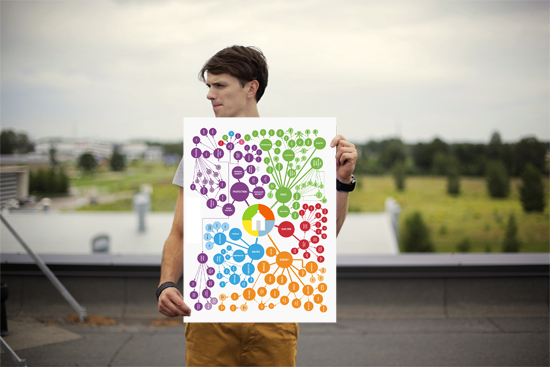
Note: This is a digital mockup of version 1 of the poster showing the real-life size, 18x24 inch. You'll get version 2 of the poster, much refined and updated with more self-reliance skills. The looks are subject to change.
On your 18x24 inch Self-Reliance Poster, printed on thick, durable matte Museum-quality paper, you'll find a "roadmap" of the most important skills our forefathers used to survive and thrive through good times and bad.
These skills weren’t “survival skills” as we regard them today, but rather what our ancestors called “daily life”. Most skills have today largely been forgotten by the average human.
With the Self-Reliance Poster on your wall, you'll get inspired every day of new things to learn and new ways to become more self-reliant and free. It's yours free as a welcome gift. All I ask is that you pay shipping and handling (flat $9.95 fee, worldwide shipping).
After Tuesday this deal will be gone and you won't be able to get this poster anywhere for a good while.
Bonus #1: The Self-Reliance Calendar
True self-reliance is only possible when it’s done in balance with nature, and that means being in tune with the seasons.
Homesteaders of old were intricately connected with nature and the moon cycles and knew what to do when, from planting to cutting firewood and bringing in the harvest. Much of that knowledge has been forgotten, but the knowledge is still out there.
We’re bringing this knowledge back to life in the Self-Reliance Calendar, only available to members of Self-Reliance 365. We launched it back in November 2015, and at the start of each month you'll get a report covering the things that were done in the days of old.
- in the forest
- on the field
- in the kitchen garden
- in the orchard
- in the home
- and more
Bonus #2: Exclusive Self-Reliance Calculators
In the Calculators section of Self-Reliance 365 you'll find custom Done-For-You calculators that we've developed to make your self-reliant life easier, all based on accurate, scientific formulas.
Whether you want to figure out the perfect size for a solar PV system, how many batteries you need in the battery bank, or how thick wires your PV system requires, we've got calculators for all of those, and more.
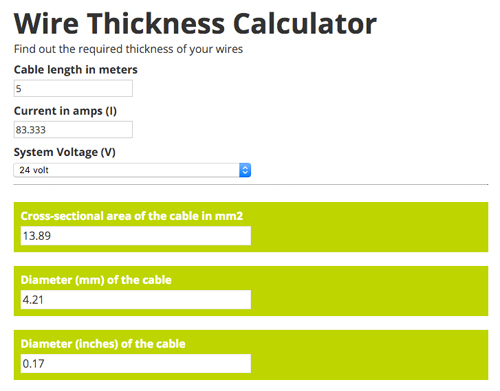
One of many calculators you'll find in the members area. Having the right wire thickness for your solar PV system is critical. This calculator helps you get it right.
In our Water Calculators section you'll also find calculators that will help you figure out how much rainwater (in gallons or liters) you can collect annually from a certain catchment area.
No more calculating long and complex mathematic formulas by hand, our calculators does the heavy lifting for you automatically. All calculators that you'll find in the Execution Plans will also be gathered here in one place.
Bonus #3: Self-Reliance Deals & Discounts
As a member of Self-Reliance 365 you'll have someone who is constantly hunting down and negotiating exclusive deals and discounts for you on the best products in self-reliance.
Whenever we see something we like, be it a company selling seeds, preparedness supplies, solar panels, a particular product or even an online course, you can count on us reaching out to them to try and get you a good deal.
For example, right now in the members are you'll find discounts such as:
- 10% discount on solar panels and solar generators
- 10% discount on high quality dehydrated foods from the oldest, continually operating and family owned food storage company in the US
- 15% discount on a portable multi-fuel emergency preparedness stove
- 20% discount on self-reliance and survival books
- 7% discount on the popular Berkey Water Filtration Systems from a top US Authorized Dealer
- And more!
These deals and discounts will make your Self-Reliance 365 membership quickly pay for itself even if you take advantage of just a few of the discounts - and many of these products you'll probably buy anyway!
Only Self-Reliance 365 members get access to these discounts. We prefer to keep it that way, but we won’t get angry if you share a discount with a friend (although we’d love it if you put in a good word for us when you do).

Here's what life will be like AFTER you've built a Self-Reliant Life:
Just imagine…
If food prices triple, or even worse the supermarket shelves are emptied after a serious crisis strike…
You will be OK, because you’ll have a productive and abundant garden producing a wide variety of nutritious foods and medicinal plants.
If (or should I say when) the deteriorating power grid reaches a breaking point and people have to live with rolling blackouts, or at the least serious spikes in their energy bill...
You will be OK, since you’ll generate your own power and heat from the sun, the wind, maybe even the Earth’s own heat that’s leaking up from its molten core.
Even if another financial shock hits the world and banks start to collapse…
You will be OK, because you'll have savings invested in real physical assets that are inflation-proof and confiscation-proof, such as a productive garden.
You can do some of these things at very little cost, and the best thing with self-reliance is that every solution you’ll find in Self-Reliance 365 is one that makes sense no matter what might happen next.
If all hell breaks loose and the global economy tanks, you’ll be very glad you planted that edible garden and installed that solar PV system.
But if 5 years from now none of this happens and you’ve got all of this delicious and healthy food and cheaper, more resilient energy you’re definitely no worse off and you can call me a crazy son of a bitch!
So you get it all…
The Execution Plan Library (our checklists, reports, and “cheat sheets…that we're building out to include literally every system and life skill we use to run our resilient homesteads…) where you’ll find the first couple of Execution Plans waiting for you:
- The 6-Part Rural Property Purchase Checklist
- The 6 Step Guide To Select Components For Your Off-Grid Solar System
- Blackouts: The 3-Part Preparedness Plan That Will Keep You Safe In The Dark
- How To Figure Out The Optimal Size For Your Off-Grid Solar PV System (in 5 Steps)
- Build The Essential Crisis Preparedness Kit
- Designing The Lean Homestead in 3 Steps
- Plus all future Execution Plans (1-2 added every month)
The Self-Reliance Poster - An 18x24 inch poster with a "roadmap" of the most important lost skills our forefathers used to survive and thrive through good times and bad. Printed on thick, durable matte Museum-quality paper.
The Self-Reliance Calendar - Monthly to-do lists based on how the farmers of old lived in balance with nature and the seasons.
Custom Calculators - Done-For-You calculators developed to make your self-reliant life easier.
Self-Reliance Discounts and Deals on popular products and supplies for self-reliance, homesteading and off-the-grid living.

What Does Self-Reliance 365 Cost?
You’d think that something that will help you produce your own nutritious food, clean water, and resilient energy would cost a lot, considering how much you spend on all of these things every year.
Just take food for example. According to the United States Department of Agriculture, a family of four can get away with spending $568 per month on food, but only if they follow the bare minimum “thrifty” food plan. A more humane food plan will set you back $893.1 per month, or $10,717.20 per year.
And when it comes to energy, the average U.S. household spends over $110 per month on electricity, or $1,320+ per year (U.S. Department of Energy).
Last but not least, just think about the thousands of dollars that you pay in taxes to the government each year, where every tax dollar allows them to further increase their control over you.
You spend thousands to tens of thousands of dollars on food, energy, water, rent / mortgage, and taxes every year, all of which keep you highly dependent on the system that is crumbling before our eyes.
But let me ask you, how much do you spend every year on systems that increase your personal freedom with each passing year?
Regardless of your answer, you don’t have to pay thousands of dollars on Self-Reliance 365. In fact I wouldn’t want you to, because I want as many people as possible to join me in this movement.
I know these are hard times, and with increasingly desperate governments trying to squeeze more and more tax dollars out of each and every citizen to avoid bankruptcy, it’s bound to get even worse.
With that in mind...
You Get It ALL – For A Full Year – For Less Than 22 Cents a Day
That’s right…
When you join Self-Reliance 365 today you pay only $6.6 per month (billed annually at $79) and you lock in this rate for as long as you stay a member, even when inflation will force us to raise the price in the future.
But I can only guarantee this price when you join now, because I want to reward action takers and we’re planning to add new Execution Plans fast (and we will raise the price as more Execution Plans and Discounts are added to reflect the increased value).
You don’t need to decide now.
Remember, this order is simply an opportunity for Self-Reliance 365 to sell itself to you. There is no sale - no obligation to keep it - until you have tried it out in your own home for 60 days and are satisfied. Just let us give you access to these first three Execution Plans for your examination. If you're not satisfied, let us know and you will get a prompt and full refund (excluding the non-refundable shipping and handling fee).
But remember, too, that now is the time. After the proverbial shit hits the fan, anyone can say what the outcome has been, and what exactly triggered the system failure, but hindsight of this kind is seldom very valuable.
It is the person with foresight who can plan ahead and hedge the systems now that will thrive in the future when others struggle to merely get by.
And remember, only those who join before Tuesday at midnight (11.59 PM EST) get the Self-Reliance Poster for free as a welcome gift (value $29.99), so act now!
So start your risk-free evaluation period now, and become the master of your own fate.
Click the Add to Cart button below and fill out the form on the next page, and let’s get started…

Join Self-Reliance 365 Risk-Free
Love it in 60 Days... Or Your Money Back
The amount of education and advice you’ll get from your Self-Reliance 365 membership is off the charts. And at less than 22 cents a day, it’s also a steal. For ~$6.6 a month (you'll be billed $79 for the entire year, renewed annually), you get all the Execution Plans, and Checklists, discounts on self-reliance tools and products, and much more.
Try Self-Reliance 365 risk-free for 60 days. If you’re not bowled over with the value you’re getting for your small investment, we’ll cheerfully return your initial payment and never charge you again. * Shipping and handling fee is non-refundable.
Which Door Do You Choose?
Door #1: You forget you ever read this letter and keep trusting the old system of consumption and fragile infrastructure, and just hope that the politicians and bankers that run your country manage to kick the can down the road for the remainder of your life. If you’ve seen the Matrix (a favorite movie here at Walden Labs HQ), this is the equivalent of choosing the blue pill. The story ends, you wake up tomorrow and believe whatever you want to believe.
Door #2: You take the red pill, you stay in wonderland and we’ll show you how deep the rabbit hole of your forefathers goes. You learn life skills worthy to be passed down to your children, take real practical action and build your self-reliance by doing things that make sense no matter what happens, and no matter what crazy shenanigans your politicians come up with.
Remember, all Self-Reliance 365 is offering is practical and resilient solutions for self-reliance. The door is wide open, but you have to walk through it yourself.
Click the Add to Cart button now. Remember you’re protected 100% by our money back guarantee. Test drive Self-Reliance 365 for 60 days free of obligations.
You’ll get The Execution Plan Library (all our checklists, reports and “cheat sheets” …that will cover literally every system and heritage life skill we use for self-reliance…), the 18x24 inch Self-Reliance Poster shipped worldwide, The Self-Reliance Calendar, Custom Calculators, exclusive Self-Reliance Deals & Discounts...
Plus all future Execution Plans and bonus material and discounts, for only $79 today (plus $9.95 shipping and handling for the Self-Reliance Poster).
Click the "Join Self-Reliance 365 Today" button now and get started!
To your self-reliance, Dan West Co-founder & CEO, Walden Labs P.S. You know things are screwed up. Pointing that out really isn’t necessary. The old system of centralized power and production is failing, so I hope you join me and learn how to build your own, better, food-, water- and energy-producing systems. Systems that help you live the good life, no matter what happens. Lock in your member rate of only $79 today. Click here now.

